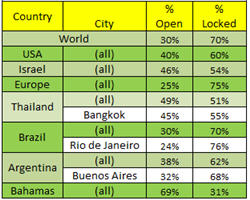 A study of 50 million Wi-Fi networks around the world by WeFi — the company claims to have “the world’s largest community-based global Wi-Fi network” — found that 40 percent of the American Wi-Fi networks it examined were unprotected. No password. Open to everyone.
A study of 50 million Wi-Fi networks around the world by WeFi — the company claims to have “the world’s largest community-based global Wi-Fi network” — found that 40 percent of the American Wi-Fi networks it examined were unprotected. No password. Open to everyone.
Is that bad or good?
People seem to be irreconcilably divided on the issue of open networks. In 2002, I attended a panel discussion where experts who had briefed then-czar of cybersecurity Richard Clarke didn’t even debate the merits of open networks. They stamped them a potential “terrorist tool.” Al-Qaeda, they said, was going to camp out in your company’s parking lot and launch attacks on the Internet if you didn’t lock down your Linksys box with 128-character passwords.
 I’m in the other camp: Passwords suck. Free Wi-Fi boosts America’s productivity. Whenever I find an open network, I spend a minute trying to figure out who operates it so I can send them a thank-you mail.
I’m in the other camp: Passwords suck. Free Wi-Fi boosts America’s productivity. Whenever I find an open network, I spend a minute trying to figure out who operates it so I can send them a thank-you mail.
AI Weekly
The must-read newsletter for AI and Big Data industry written by Khari Johnson, Kyle Wiggers, and Seth Colaner.
Included with VentureBeat Insider and VentureBeat VIP memberships.
WeFi’s study says that the most open countries for traveling Web surfers are Thailand, Israel, Brazil, Argentina and especially the Bahamas, where 69 percent of networks are open to the pubic.
By contrast, only 25 percent of observed networks in Europe are open. For now, WeFi hasn’t drawn any conclusions on why, or on what it all means. These stats are the first released numbers from a more detailed report the company plans to publish later in the first quarter of 2010.
Check out our CES 2010 coverage.
VentureBeat's mission is to be a digital town square for technical decision-makers to gain knowledge about transformative enterprise technology and transact. Learn More